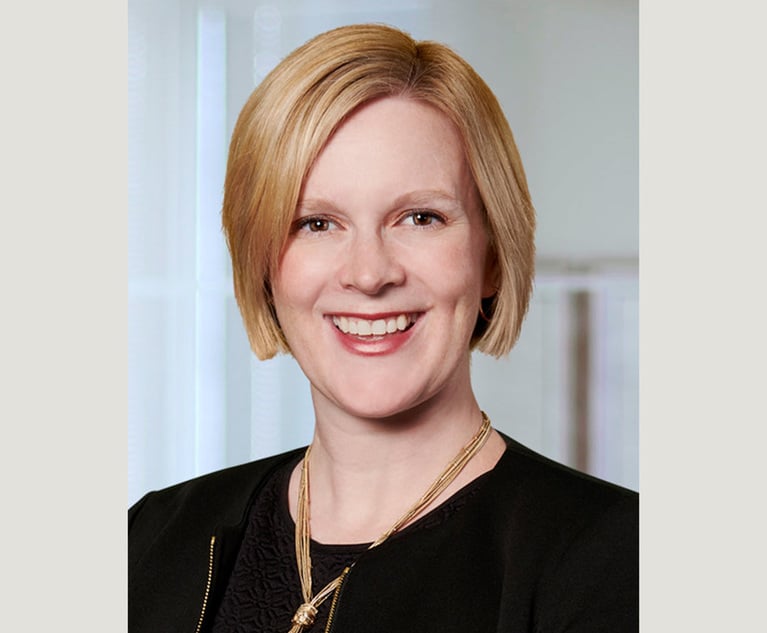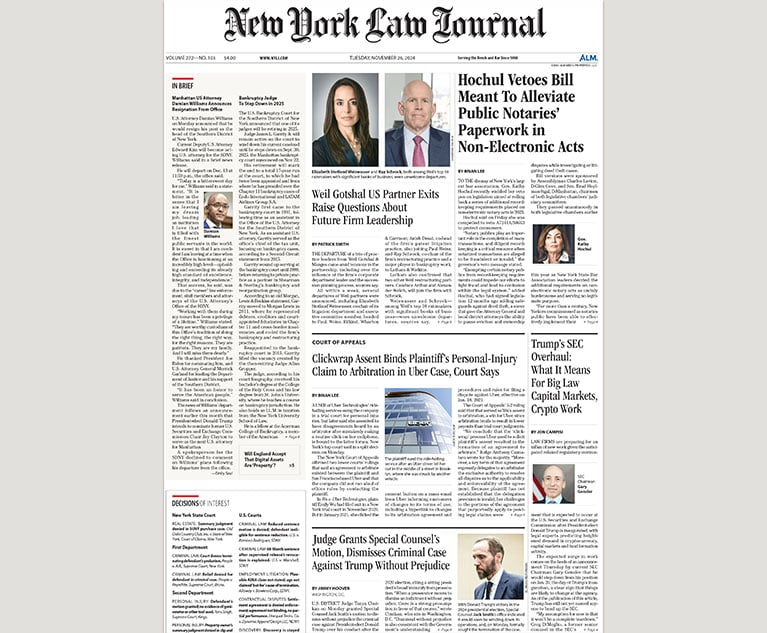 Photo: Roman Seliutin/Shutterstock.com
Photo: Roman Seliutin/Shutterstock.comNY's Moses & Singer Sues Former Partner Over $1.1 Million Loan
The loan dates from the same day the firm and ex-partner Stephen Weiss settled with a former client that accused them of legal malpractice.
December 06, 2019 at 04:36 PM
4 minute read
New York and New Jersey-based Moses & Singer has sued one of its former partners for $1.74 million, seeking to recover money the partner borrowed on the same day he and the firm settled an ex-client's legal malpractice lawsuit seven years ago.
Since borrowing $1.173 million from Moses & Singer in November 2012, Stephen Weiss, who now works out of his own law office in midtown Manhattan, has only paid back $14,500, the law firm claimed in filings Thursday in New York County Supreme Court. Weiss allegedly owes Moses & Singer $1,158,500 in principal and $582,637 in interest, the latter of which grows $407.63 a day.
Weiss declined to comment on the lawsuit, saying he hasn't been served yet.
Weiss allegedly borrowed the money from his former firm at the same time they were fending off a legal malpractice claim from E-Pass Technologies in San Francisco federal court. An undisclosed settlement was reached between E-Pass, Weiss and Moses & Singer on the same day Weiss borrowed the money—Nov. 16, 2012. Moses & Singer made "payments … towards settlement of litigation against" Weiss, according to the promissory note.
A former client of Weiss and the firm's, E-Pass accused them of filing meritless patent-infringement cases on their credit card-related patent in 2000. E-Pass suffered multiple losses in federal court, and had to pay at least $7.6 million in fees to Weiss and the firm, and at least $2.3 million to the defendants.
E-Pass claimed Weiss had a "serious conflict of interest" working as both a lawyer for Moses & Singer and as E-Pass' treasurer and secretary because "he had a strong financial interest in generating and realizing as much fee income as possible from E-Pass." (Weiss and the firm denied the claims.)
Weiss made his first payment to Moses & Singer in December 2013, cutting his former firm a $10,000 check. In a December 2013 letter to Philippe Zimmerman, a Moses & Singer partner, Weiss said his ability to collect on the terrorism cases "have not materialized as quickly as I had hoped."
Weiss is representing some of the victims who sued the governments of Sudan and Iran following the 1998 U.S. embassy bombings in Tanzania and Kenya that killed 224 people and injured more than 4,000. Although a federal judge initially awarded a $10.2 billion default judgment against Sudan, the damages were paired down to $6 billion and the case is pending before the U.S. Supreme Court.
"While I had hoped that some monies from the terrorism cases would have gone to Moses & Singer by now, I want you to know that I am mindful of my debt and plan to make payments as income comes in until my obligations are satisfied," Weiss wrote.
Moses & Singer appears to have doubted Weiss' statements about not having enough money to pay his former firm back. In a June 3, 2014, email to Zimmerman, Weiss noted that a private investigator the firm hired "ascertained that I was telling the truth about my lack of assets."
In that same email, Weiss said he told his former colleagues that the money "would have to come" from the damages in the Sudan and Iran terrorism cases.
"Nevertheless, my practice is generating some income, but barely enough to cover my overhead and living costs, but not enough to permit me to squeeze out anything extra for M&S," Weiss wrote. "I would remind you that last year I did manage a token payment out of my income to show good faith and to show that I recognize my obligation to M&S and that I intend to make good on it."
Weiss sent a $2,500 check in April 2016 and a $2,000 check in May 2016. Those were the last checks he sent prior to the filing of Moses & Singer's lawsuit.
The interest on Weiss' $1.173 million loan was 7% a year; the interest rate would increase to 9% if Weiss was late on paying the money back.
Zimmerman on May 9 told Weiss he had one week to pay $1.701 million—the original balance plus interest. In response, Weiss proposed cutting Moses & Singer in on any potential payout from the Iran and Sudan cases. It's unclear what happened to Weiss' proposal, but on Nov. 19, Zimmerman sent Weiss another letter, giving him three days to pay back the $1.74 million he allegedly owed the firm.
Zimmerman and Jay Fialkoff, Moses & Singer's managing partner, did not respond to requests for comment.
This content has been archived. It is available through our partners, LexisNexis® and Bloomberg Law.
To view this content, please continue to their sites.
Not a Lexis Subscriber?
Subscribe Now
Not a Bloomberg Law Subscriber?
Subscribe Now
NOT FOR REPRINT
© 2024 ALM Global, LLC, All Rights Reserved. Request academic re-use from www.copyright.com. All other uses, submit a request to [email protected]. For more information visit Asset & Logo Licensing.
You Might Like
View All
How My Postpartum Depression Led to Launching My Firm’s Parental Leave Coaching Program
9 minute read
Patent Trolls Come Under Increasing Fire in Federal Courts
Trending Stories
Who Got The Work
Michael G. Bongiorno, Andrew Scott Dulberg and Elizabeth E. Driscoll from Wilmer Cutler Pickering Hale and Dorr have stepped in to represent Symbotic Inc., an A.I.-enabled technology platform that focuses on increasing supply chain efficiency, and other defendants in a pending shareholder derivative lawsuit. The case, filed Oct. 2 in Massachusetts District Court by the Brown Law Firm on behalf of Stephen Austen, accuses certain officers and directors of misleading investors in regard to Symbotic's potential for margin growth by failing to disclose that the company was not equipped to timely deploy its systems or manage expenses through project delays. The case, assigned to U.S. District Judge Nathaniel M. Gorton, is 1:24-cv-12522, Austen v. Cohen et al.
Who Got The Work
Edmund Polubinski and Marie Killmond of Davis Polk & Wardwell have entered appearances for data platform software development company MongoDB and other defendants in a pending shareholder derivative lawsuit. The action, filed Oct. 7 in New York Southern District Court by the Brown Law Firm, accuses the company's directors and/or officers of falsely expressing confidence in the company’s restructuring of its sales incentive plan and downplaying the severity of decreases in its upfront commitments. The case is 1:24-cv-07594, Roy v. Ittycheria et al.
Who Got The Work
Amy O. Bruchs and Kurt F. Ellison of Michael Best & Friedrich have entered appearances for Epic Systems Corp. in a pending employment discrimination lawsuit. The suit was filed Sept. 7 in Wisconsin Western District Court by Levine Eisberner LLC and Siri & Glimstad on behalf of a project manager who claims that he was wrongfully terminated after applying for a religious exemption to the defendant's COVID-19 vaccine mandate. The case, assigned to U.S. Magistrate Judge Anita Marie Boor, is 3:24-cv-00630, Secker, Nathan v. Epic Systems Corporation.
Who Got The Work
David X. Sullivan, Thomas J. Finn and Gregory A. Hall from McCarter & English have entered appearances for Sunrun Installation Services in a pending civil rights lawsuit. The complaint was filed Sept. 4 in Connecticut District Court by attorney Robert M. Berke on behalf of former employee George Edward Steins, who was arrested and charged with employing an unregistered home improvement salesperson. The complaint alleges that had Sunrun informed the Connecticut Department of Consumer Protection that the plaintiff's employment had ended in 2017 and that he no longer held Sunrun's home improvement contractor license, he would not have been hit with charges, which were dismissed in May 2024. The case, assigned to U.S. District Judge Jeffrey A. Meyer, is 3:24-cv-01423, Steins v. Sunrun, Inc. et al.
Who Got The Work
Greenberg Traurig shareholder Joshua L. Raskin has entered an appearance for boohoo.com UK Ltd. in a pending patent infringement lawsuit. The suit, filed Sept. 3 in Texas Eastern District Court by Rozier Hardt McDonough on behalf of Alto Dynamics, asserts five patents related to an online shopping platform. The case, assigned to U.S. District Judge Rodney Gilstrap, is 2:24-cv-00719, Alto Dynamics, LLC v. boohoo.com UK Limited.
Featured Firms
Law Offices of Gary Martin Hays & Associates, P.C.
(470) 294-1674
Law Offices of Mark E. Salomone
(857) 444-6468
Smith & Hassler
(713) 739-1250








